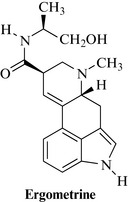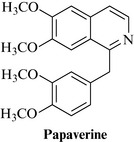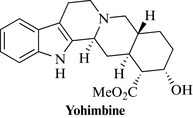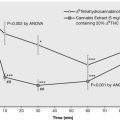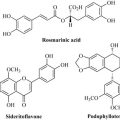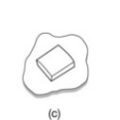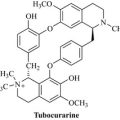Chapter 20 The reproductive tract
Phytomedicines in childbirth
Ergometrine 
Ergometrine (Fig. 20.1) is an alkaloid extracted from ergot (Claviceps purpurea Tul.), a parasitic fungus growing on cereals, usually rye. It is used to manage the third stage of labour (in conjunction with oxytocin), and to control postpartum haemorrhage if the placenta has not been completely expelled. It must be used only under the care of a midwife or obstetrician.
Raspberry leaf, Rubus idaeus L. (Rubi idaei folium)
Therapeutic uses and available evidence
A retrospective observational study on 108 mothers in Australia indicated that a shortening of labour and reduction in medical intervention occurred, with no untoward effects apart from a single case of diarrhoea and anecdotal reports of strong Braxton Hicks contractions. However, a larger, randomized placebo-controlled trial of 192 women by the same authors did not confirm such benefits, although no adverse effects for either mother or baby were noted (Simpson et al 2001). Uterine relaxant effects have been demonstrated in animals (Rojas-Vera et al 2002), and raspberry leaf appears to affect only the pregnant uterus of both rats and humans, with no activity on the non-pregnant uterus. However, no further identification of the active principle(s) has been made and a recent review concludes that in the absence of good clinical data, raspberry leaf cannot be recommended in pregnancy (Holst et al 2009).
Male sexual dysfunction (impotence)
Epimedium brevicornum Maxim (Epimedii herba) and Epimedium spp.
Therapeutic uses and available evidence
Icariin has phosphodiesterase type 5 inhibiting effects (the mechanism of action of sildenafil) and may also have neurotrophic effects (Zeng et al 2010, Ma et al 2011). A study of the effects of icariin administered daily to cavernous nerve-injured rats found that the ratio of intracavernous pressure to arterial pressure was significantly higher compared with control (and also single-dose icariin-treated) animals. The penile tissue of rats treated with icariin showed greater positivity for neuronal nitric oxide synthase and calponin, and cultured pelvic ganglia treated with icariin had significantly greater neurite length (Shindel et al 2010). Icariin is also a bone anabolic agent that may exert its osteogenic effects through the induction of bone morphogenetic protein-2 and NO synthesis, subsequently regulating gene expression and contributing to the induction of osteoblast proliferation and differentiation (Hseih et al 2010).
Papaverine 
Papaverine (Fig. 20.2) is an alkaloid extracted from the opium poppy (Papaver somniferum L.). It is most often used for the treatment of impotence of neurological or psychogenic origin. As it must be given by intracavernosal injection, it is normally only used as a last resort when less invasive treatments have failed.
Holst L., Wright D., Nordeng H., Haavik S. Raspberry leaf – should it be recommended to pregnant women? Complement. Ther. Clin. Pract.. 2009;15:204-208.
Hseih T.P., Sheu S.Y., Sun J.S., Chen M.H., Liu M.H. Icariin isolated from Epimedium pubescens regulates osteoblasts anabolism through BMP-2, SMAD4, and Cbfa1 expression. Phytomedicine. 2010;17:414-423.
Ma H., He W., Yang Y., et al. The genus Epimedium: An ethnopharmacological and phytochemical review. J. Ethnopharmacol.. 2011;134:519-541.
Rojas-Vera J., Patel A.V., Dacke C.G. Relaxant activity of raspberry (Rubus idaeus) leaf extract in guinea-pig ileum in vitro. Phytother. Res.. 2002;16:665-668.
Shindel A.W., Xin Z.C., Lin G., et al. Erectogenic and neurotrophic effects of icariin, a purified extract of horny goat weed (Epimedium spp.) in vitro and in vivo. J. Sex. Med.. 2010;4 Pt 1:1518-1528.
Simpson M., Parsons M., Greenwood J., Wade K. Raspberry leaf in pregnancy: its safety and efficacy in labor. J. Midwifery Womens Health. 2001;46:51.

